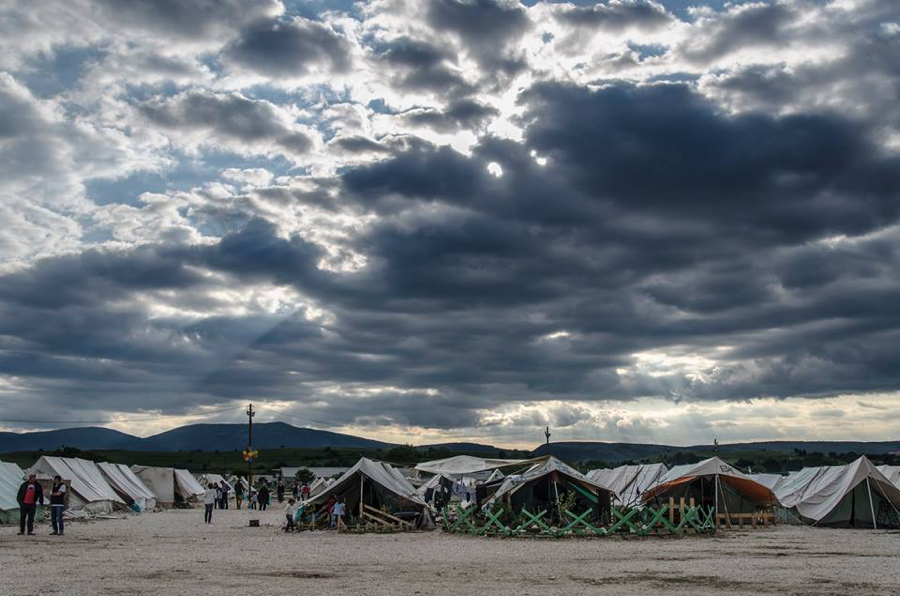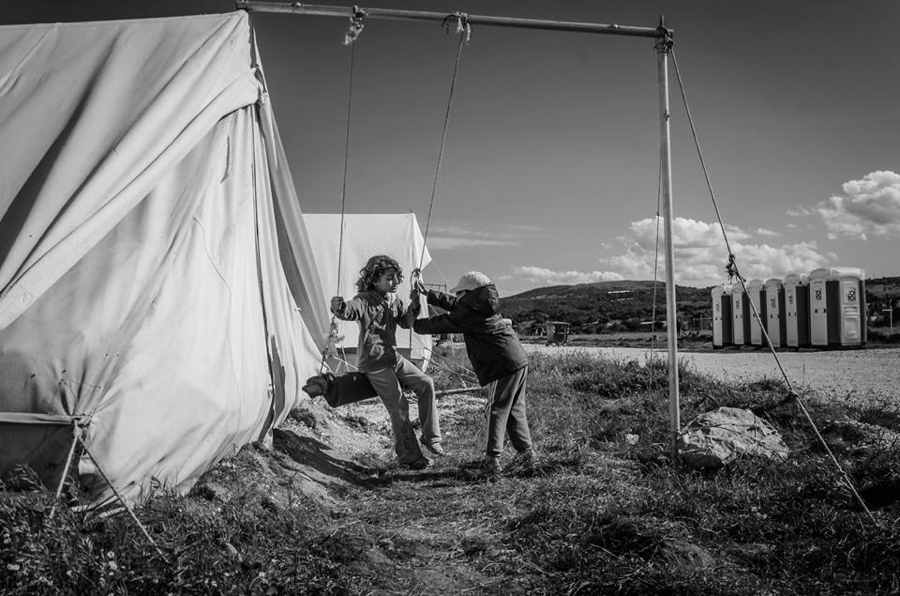For Refugees at Katsikas Camp, Life Remains in Limbo
by Martin Waldman, July 26, 2016.
 |
| Katsikas camp. Photo by Cristina del Campo Martín |
Sitting on the matted floor of his tent with an arm spread across a
military-provided cot, Mohanad takes a long, pensive drag off a
cigarette. “We didn’t leave because we wanted to. We had homes, we had
jobs, we had cars.”
Months of bitterness and frustration are palpable through a caustic
smile. “And now I just wait. They might take months, or years, of my
life. I don’t know.
“This isn’t living – this is surviving.”
In early March, in the hopes of finding a safe place to start a
family, Mohanad left his home near the Syrian city of Homs and, like
hundreds of thousands before him, made his way via Turkey, the
Mediterranean and the island of Lesvos to mainland Greece. Today, he is
one of roughly 800 people living at Katsikas camp, a
military-administered refugee camp six kilometres outside the city of
Ioannina in northwestern Greece, and one of roughly 40 such camps that have emerged across the country since late winter.
Arriving at Katsikas in mid-April, I was immediately struck by the
contrast in settings: picturesque, snow-capped mountains dominate the
horizon, with rolling green foothills in the foreground; while the camp
is a dusty sea of large jagged rocks and row upon row of identical
triangular tents.
Each large tent is given a letter-number combination, and the rows
and sections of tents coincide with ethnic and linguistic communities:
Palestinian-Syrians, Iraqi Kurds, Yazidis, Afghans, and so on. The
weather in the region is volatile and intense, alternating between clear
blue skies with punishing sun, and incessant heavy rain, usually for
two or more days in a row.
When she first made her way to Katsikas in March to continue her
volunteer work in Greece, María Peñalosa was under the impression that
she would primarily be helping distribute milk, diapers and other basic
supplies in the newly established camp. “There were seven of us to 1,200
refugees when we arrived,” she recalls. “Everyone was freezing, and
there was absolutely nothing in the entire camp besides the tents
themselves, without floors. People didn’t have shoes, socks or proper
clothes – it was a desperate situation.”
After an especially turbulent first few weeks, a support network
began to take shape. A few small NGOs arrived in Katsikas, as did
growing numbers of volunteers and increasing donations of food, clothing
and other basic supplies from across Europe. With the exception of a
small core of long-term mainstays such as María, the roster of
volunteers fluctuates regularly, usually numbering around 40.
 |
| Photo by Cristina del Campo Martín |
Through creativity and tenacity, the volunteers at Katsikas have
managed to improve the day-to-day conditions for those living at the
camp. They have set up equitable distribution systems for clothing and
basic supplies, they lead language classes and movie nights, they cook
hearty meals to supplement the barely edible and nutritionally
inadequate military rations, and they have built communal spaces and
private bathing cabins for women, among many other initiatives.
Despite these efforts, however, the living conditions at the camp
remain poor. Tents flood when it rains and are stiflingly hot on warm
days; toilets, of the portable variety, are extremely unsanitary;
drainage systems are inadequate, with puddles of standing water
providing a breeding ground for insects. There is a lack of communal
spaces for women. Children, who make up about one-third of the camp’s
population, are especially vulnerable to diseases—and are perpetually
bored.
Still, Katsikas is far from the worst of Greece’s military-run camps. Especially since Greek police evacuated the enormous improvised refugee camp at Idomeni in late May and dispersed the thousands of refugees remaining there to new, official sites, reports have surfaced of extremely poor conditions in many of the camps across the mainland.
On another afternoon in Mohanad’s tent, he mentions a brief WhatsApp
chat he had with an acquaintance from back home who is currently stuck
in a detention centre on the island of Chios. “I guess I was one of the lucky ones.”
He is referring to his date of arrival in Greece, March 19, one day before the EU-Turkey deal came into effect and the registration “hot-spots” on the Greek islands off the Turkish coast became closed detention centres.
Of course, none of the vague promises or absurdly convoluted proposals
in the deal were ever going to be made a reality, not least because
many of the suggested measures contravene international human rights
law, and because the idea of actually granting visa-free travel to
Turkish citizens within three months was never really on the table. The
deal was a transparent political maneuver to take pressure off EU
leaders seen as doing little to manage—or, more accurately, stop—the
continued refugee influx from Turkey into Greece.
This crass political move has serious human consequences. The core
concept of the deal is the same notion that continues to inform
migration policy in the EU and beyond: deterrence. Make life
increasingly miserable for those who arrive, and those yet to come will
get the hint and stay home; offer safe and dignified living conditions,
and the floodgates will open. It is an approach that shows a complete
lack of understanding of the gravity of the situation in conflict areas,
and one that abandons any notion of human rights or basic compassion.
Over five weeks I spent volunteering at Katsikas, I was told of lives
left behind in cities that have become shorthand for despicable
atrocities and brutal violence: Raqqa, Mosul, Sinjar, Palmyra, Aleppo.
Yet, the act of fleeing some of the most dangerous places in the world
is currently being punished with substandard living conditions and a
maddening, perpetual state of limbo and uncertainty; the same principle
of deterrence is in effect.
In late May, the UNHCR announced that it would be collaborating with the Greek Asylum Service to begin pre-registration
of refugees at camps across the mainland, a necessary part of the
protracted process of applying for asylum in Greece or elsewhere in
Europe. By late June, no one at Katsikas has been able to pre-register
yet; the latest indication is that this will start in mid-July, but
official predictions are rarely taken seriously anymore.
In a multi-step
process that moves at a glacial pace, the refugees at Katsikas are
still at Step 0. As many enter their fourth month at the camp and the
Greek summer intensifies, they will continue to be pushed to their
limits—and beyond. For them, as for some 50,000 other refugees stuck
across Greece, there is still no end in sight.
SOURCE: Global voices


